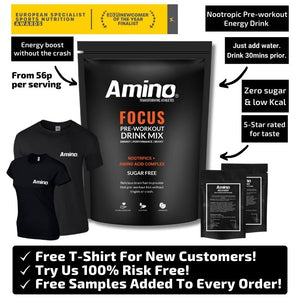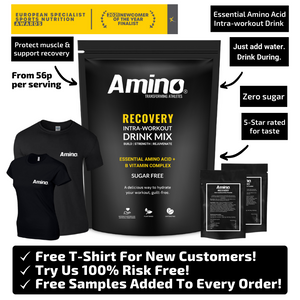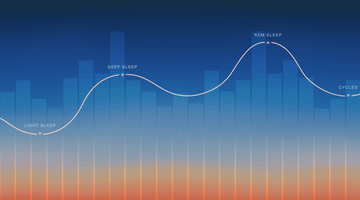If you’re an athlete or into your fitness, then you probably know that protein is a vital part of your diet. But, on the other hand, did you know that different kinds of protein are absorbed differently and may have an impact on your workouts? As any sports nutritionist will tell you, there are many factors that play into how quickly and efficiently your body can digest proteins before training. In this article, we explore how to digest protein before training, how to improve protein digestion and much more.
What is protein broken down into?
When consumed, protein is broken down into amino acids during digestion. Protein digestion begins when you start to chew. There are two enzymes in your saliva – amylase and lipase – and their role is largely to break down carbohydrates and fats.
Once proteins reach your stomach, the highly acidic atmosphere helps to break them down, along with enzymes called proteases. These two factors break the protein into smaller chains of amino acids. These are joined together by peptides which are, in turn, further broken down by proteases.
These smaller chains of amino acids then move from your stomach to your small intestine, where your pancreas secretes more enzymes to reduce the acidity of the digested food, along with a bicarbonate buffer. This helps the enzymes to break the amino acid chains into individual amino acids, which are then absorbed into the blood.
Related: What are Amino Acids and Why do You Need them?
Related: How to Boost Cardio Performance with Protein
How quickly is protein digested?
This process happens constantly and the speed depends on the source of protein and what’s going on in the body. Some are easier to digest than others. On average, it takes around 30 minutes to digest lean fish and 45 minutes to digest a boiled egg.

Republished from Sports Nutrition Handbook
It’s also important to note that when protein synthesis in the muscles increases, the digestion of protein in your gut slows down. That means you should make sure you’re taking on the right type of protein at the right time, to ensure it’s digested before you hit the gym and you’re not left nursing a stitch!
How to use protein before training?
Consuming protein, either alone or with carbohydrates, before a workout has been shown to increase muscle protein synthesis. Eating protein before exercise can also:
- Improve muscle recovery
- Increase strength and lean body mass
- Increase muscle performance
But, as noted above, it’s important to consume the right type of protein at the right time.
Protein absorption happens in your small intestine, which contains microvilli. These small structures allow amino acids to be absorbed. Once they’ve been absorbed, they’re released into your bloodstream, where they start to work their magic on muscle growth and repair.
Consuming 20-30 grams of protein before a workout can support faster muscle protein synthesis for several hours, helping recovery after your session. It’s recommended that you consume a full meal 2-3 hours before your workout. This should include sources of essential amino acids, such as meat, fish, or eggs.
You can then consume a pre-workout snack or shake around 45-60 minutes before your workout. On days where this may be difficult to plan, choose something that’s easy to digest, like a Amino's RECOVERY an EAA intra-workout drink, which is light on the gut as there is no digestion needed, it is rapidly absorbed and is very popular with athletes looking to protect muscle mass and aid the recovery process from training.
Related: What to eat before and after a workout
How to improve protein digestion?
There are some good habits you should get into to help you improve protein digestion. These include:
- Eating regularly throughout the day
- Reducing your stress levels
- Chewing your food properly
- Managing any health conditions that affect digestion
- Spreading your protein intake throughout the day
- Choosing easy-to-digest protein sources, such as egg whites, tofu or milk.






